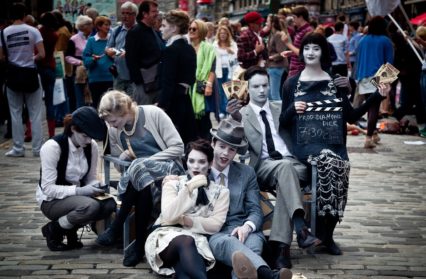Elin Williams catches more Welsh productions making their mark at the Edinburgh Fringe Festival.
The sun is finally shining in Edinburgh!
I may have got a little bit too excited about this and as a result, I’ve come very close to buying myself an extortionately priced lamb’s wool tartan shawl, but don’t worry, I haven’t. This week I decided to get a little bit cultured and visited the castle and Holyrood Palace, which was beautiful. I’ve also now successfully visited four museums: the main museum, the Surgeon’s Museum (I’ll let you in on a secret: it’s essentially pickled human remains in jars…), the Museum of Childhood (although to my sheer disappointment, the shoe-doll has disappeared) and another, smaller Museum of Edinburgh. I’ve been quite busy and have been marvelling at how many steps I’m walking on my Health app, but mostly I’ve been seeing some Welsh Theatre. This week I saw Dirty Protest’s Sugar Baby, Mr and Mrs Clarke’s F.E.A.R., and finally Volcano’s Seagulls.
Sugar Baby is a fun way to spend an hour of your time at the Fringe. It’s housed in the Roundabout at Summerhall; the perfect venue for this intimate production. Marc is a small-time drug dealer in Fairwater, Cardiff. He pretends he’s growing tomatoes, but everybody knows he’s growing weed. He’s six grand in debt to a Cardiff gangster, and in this 55 minute script, there’s love, murder and a police chase seal named Billy. Alex Griffin-Griffiths is fantastic as Marc; he bounces around the audience, making us feel very much a part of the conversation as he talks to members of the audience individually, making eye-contact before he continues to whirl around the room. The script is equally as energetic and hilarious. We have a hard time keeping up with Griffiths as he whirls from one character to another; the whole thing is wonderfully fast-paced. The script gradually descends into chaos as Marc and his seal-mate Billy run to escape the police before he eventually manages to escape with his mother abroad. Dirty Protest succeed again in making fun, original, exciting theatre and do an outstanding job representing Wales at the Fringe.
Walking into Mr and Mrs Clarke’s production at Zoo, we are faced with the huge red letters spelling FEAR and a man in a crocodile’s mask sat in the corner. This production makes some interesting comments but ultimately descends into a rant about society today. It begins with Gareth Clarke in an autobiographical reminiscence about childhood, about how we are fearful of things we don’t even know. Clarke discusses how fear is instilled in us from an early age, from the more normal, simplistic, childish fears like what happens if you go off with strangers, to the more adult fears like having a mortgage and doing the ‘right thing’. At times Clarke converses with the audience directly, making us feel a part of the discussion, but he then descends into rambling rants about the fear of terrorism, extremism and other similar subjects. That connection from earlier is severed and it’s difficult to feel whether anything revolutionary is being said. Clarke is extremely energetic and compelling in parts, but the repetition does get a bit tedious later on. There is, however, a great dance to the Crocodile Rock which really pics up the energy at the end of the production.
I had to get a bus to Leith. (I hate getting buses in cities you’re not familiar with because there are all sorts of social faux pas you can make. Will I talk to a bus driver who won’t talk back? Will I put the money in the wrong part of the machine? All legitimate concerns). But why did I need to get to Leith I hear you ask? It’s a fair question. The answer: because Swansea’s Volcano have a special, independent Fringe venue in a disused Church, and if you saw the original production of Seagulls on Swansea’s High Street, you’ll know why.
Volcano’s deconstructed piece based on the iconic Chekhov play begins with the actors suspended from the ceiling. The audience sit below as feathers tumble from the sky, falling onto laps and feet. What follows is a succession of snippets from the original script, blended seamlessly with more contemporary dialogue which is both hilarious and uncomfortable. There is subtle, meaningful symbolism used throughout the production and despite the deconstructed nature of the piece, the main narrative is clear to follow. The actors take words from the audience and improvise with what they’re given. We are then drawn into the middle of the space, allowing time for a quick seating change so we can view the newly revealed ‘lake’ more efficiently. The pool of water against the backdrop of the altar of the church is incredibly effective and surreally picturesque. The characters then flit between the tragic happenings within Chekhov’s original script and a choreographed dance to ‘Should I Stay or Should I Go Now’ mirroring Boris’ indecision whether to stay with Nina or go with Irina. Then they all get naked. Seagulls is most definitely one of the most exciting productions at this year’s Fringe Festival. It sucks all the pretentiousness out of the Chekhov script whilst expertly maintaining the universal bones of the concepts behind it. It was undoubtedly worth the bus ride.
You can read Elin’s first week blog here.












